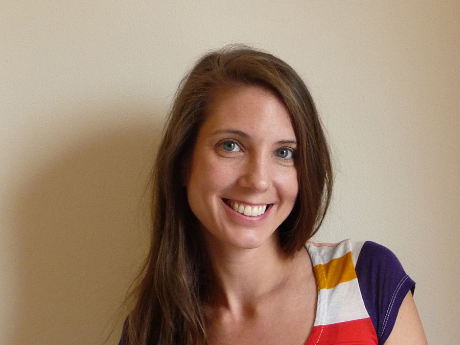In Their Own Words
Catherine Blauvelt on “Leg Me. Light Thing I Look At Bowl, Skin Width”

Leg Me. Light Thing I Look At Bowl, Skin Width
my hand as knots hold flowers where she moves.
Draw me limb, shooting to often The En-
trance. I knelt to become want's body. Cold
at the greenhouse without curtains. Down went
her hair in our place. We put hands at her
side. She doesn't turn. I ply the pins in her hair.
Soon opened on a melon ball
arranged the blur, threw flew out of our heads,
the size of our head wail. Somewhere took her,
stillness. I was reaching before our heads
lit up. I need a couch. Bone, floral slip
to top.
Keep come of us. We lie. Lift. You
watch our heads left out by a waterfall.
From Here High Note, High Note (Prelude, 2017). All rights reserved. Reprinted with the permission of the author.
On "Leg Me. Light Thing I Look At Bowl, Skin Width"
This poem begins with a plea to stand and move forward. It was written shortly after my mother's death and tracks the human here, not the human gone. I, the poet (Hello, it's me!), am the speaker.
In "Leg Me," nouns replace nouns: "bowl" equals her body—the body as container; "couch" equals body too—a resting place or a man-made object (so to speak) impossible to live without. "Floral slip" equals skin; the "greenhouse" equals the funeral home. (There are always an obnoxious number of flowers at funeral homes, and what becomes of them?) The "melon ball" is the sun in all of my poems. It marks the day beginning again as it always does—an unstoppable forward in soon.
What happens after "Soon" is the realization of loss: "I was reaching before our heads / lit up." Here, I want to return to not knowing. Our heads are "lit up" like a light bulb, an epiphany, or even more violently, like a fire.
The poem does not move linearly and ends where it began, addressing the "Light Thing" and offering an observation. Our heads are "left out" of the waterfall, and in a more violent reading, still on fire—though a solution or end is near: water. The last line evokes an image of "our" decapitated heads, the heads of those in my mother's orbit. It can be interpreted as a joke—I did lose my head after my mother's death—though it's also an image of grieving.
I'd like to say that this poem acts as an entry point into a specific time in my life, but sitting here, thinking it over, I am unable to return to that headspace. I've reconstructed my intentions in part by guesswork. Perhaps the original plea was answered or has changed completely.



